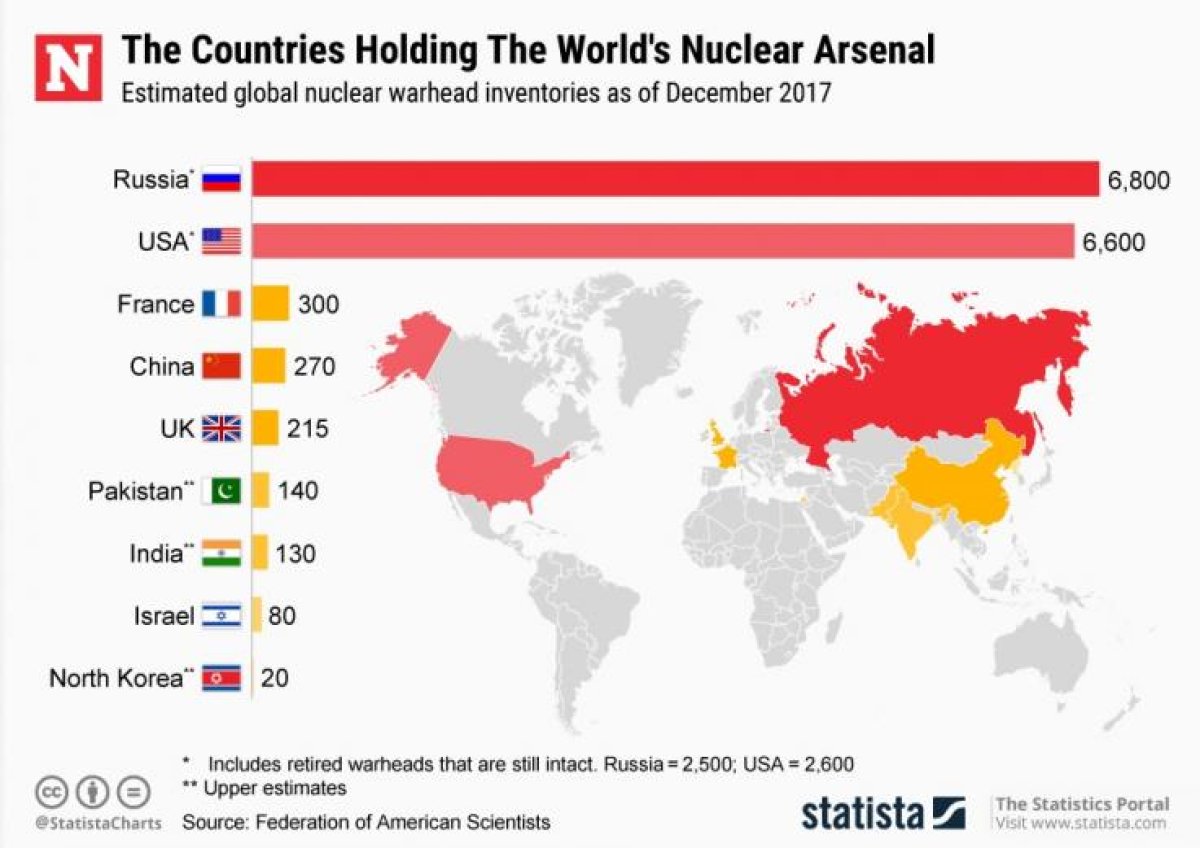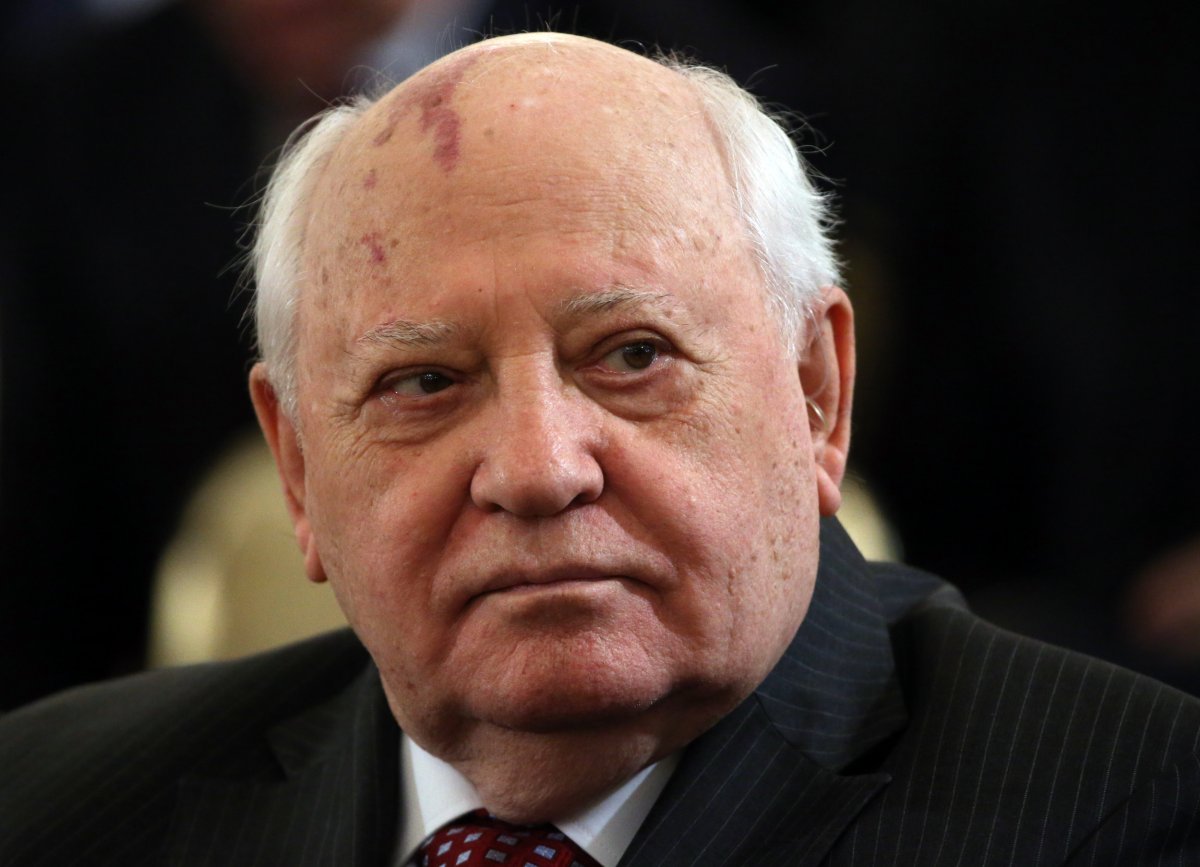Former Soviet premier Mikhail Gorbachev has urged President Donald Trump's administration to re-engage with Russia on landmark arms control treaties, warning that the collapse of Cold War-era nuclear weapon limits threatens global catastrophe.
Speaking with Japanese newspaper The Asahi Shimbun, Gorbachev lamented America's withdrawal from two key arms control treaties signed during the Cold War—the Anti-Ballistic Missile Treaty (ABMT) during President Geroge W. Bush's tenure, and the more recent withdrawal from the Intermediate-Range Nuclear Forces (INF) Treaty.
Russia has also since suspended participation in the INF Treaty, prompting concerns of a new arms race. The infographic below, provided by Statista, shows the estimated global nuclear weapons arsenals as of December 2017.

Gorbachev is a prominent advocate of nuclear disarmament. He told the Asahi he is "still praying for" the destruction of all nuclear weapons, noting that the number of warheads in Russia and the U.S. has reduced by more than 80 percent since the peak years of the Cold War.
But he warned that this "peace dividend" is now at risk with the collapse of the ABMT and INF Treaty. It is also unclear whether New START (Strategic Arms Reduction Treaty)—the successor to START I that Gorbachev helped craft—will be renewed when it expires in 2021.
The Trump administration said last year that it would ditch the 1987 INF Treaty, which banned ground-launched nuclear and conventional missiles with ranges from 310 miles 3,417 miles. The White House accused Russia of violating the deal by developing the SSC-8 missile.
But Gorbachev blamed Washington for the development. "The decision by the United States to withdraw from the INF threatens to unleash a sequence of events that would move to undo" the post-Cold War peace dividend, he said.
"Out of the three principal pillars of global strategic stability—the ABMT, INF and START—only one is left," he added, noting that the future of New START is far from certain.
Russia has said it is willing to renew the agreement, but the Trump administration is yet to make a decision.
"What's behind the United States' decision to withdraw from the INF is their striving to free themselves of any obligations with respect to weapons and obtain absolute military supremacy," Gorbachev said.
"That is an illusory aim, an unfulfilled hope. Hegemony by one single country is not possible in today's world. The result would be destabilization of the global strategic situation, a new arms race and all the randomness and unpredictability of global politics. The security of every country, including the United States, will suffer as a result."
Russia is responsible for the termination of the INF Treaty. The United States engaged Russia since 2013 to return it to compliance with the treaty but Russia chose to retain and deploy its non-compliant missile system rather than eliminate it and preserve the treaty.
A State Department spokesperson told Newsweek that the U.S. "remains committed to effective arms control that advances U.S., allied, and partner security, is verifiable and enforceable, and includes partners that comply responsibly with their obligations."
The spokesperson explained that Trump has "directed us to think more broadly than New START and include both China and Russia in our next steps. We stand ready to engage with both Russia and China on arms control negotiations that meet our criteria."
"The Administration is evaluating the possibility of an extension of the New START Treaty, taking into account the threats we face today, the changing security environment, and Russia's statement that it has no preconditions to extension."
This article has been updated to include comment from the State Department.

Gorbachev said the U.S. must bear responsibility for nuclear proliferation, given it was the first nation to harness the technology.
"They told our leaders in talks that they had developed the bomb. They said this to intimidate us, so we would bow down to America," he told the newspaper. "Their obsession with weapons is crazy."
Gorbachev called on both the U.S. and Russia to "restore the movement toward a world without nuclear weapons."
Both nations have signalled additional investment in their nuclear arsenals, including a fresh focus on low-yield, tactical nuclear weapons. Such warheads have a more local impact, reducing the danger of escalation and subsequent mutually assured destruction (MAD).
Though MAD has kept nuclear states at peace for decades, Gorbachev said it offers no guarantee for the future. "Nuclear deterrence will not protect the world from a nuclear accident or from nuclear terrorism, but would keep it under a constant threat," he told the Asahi.
"The key to resolving security issues lies not in weapons, but in politics," he added, bemoaning the freeze in bilateral relations between Washington and Moscow. "Despite everything, I believe that this is still within our capabilities," he added.
As for Trump, the Cold War leader said, "I hear from the current president of the United States that they are the richest country, that they have more money than anybody else, so there is going to be a new arms race. Who is America planning to fight, however? The first country to come to mind, of course, is Russia."
"We should never let ourselves embark on a course of developing nuclear weapons again and of a new arms race," Gorbachev warned. "We have to stop working on pipe dreams, and engage with realpolitik. We don't need an apocalypse! We need peace!"
Uncommon Knowledge
Newsweek is committed to challenging conventional wisdom and finding connections in the search for common ground.
Newsweek is committed to challenging conventional wisdom and finding connections in the search for common ground.
About the writer
David Brennan is Newsweek's Diplomatic Correspondent covering world politics and conflicts from London with a focus on NATO, the European ... Read more
To read how Newsweek uses AI as a newsroom tool, Click here.








